河南省濮阳市综合高中英语(人教版)必修一课件:Unit 2 《English around the world》(共75张PPT)
文档属性
| 名称 | 河南省濮阳市综合高中英语(人教版)必修一课件:Unit 2 《English around the world》(共75张PPT) |
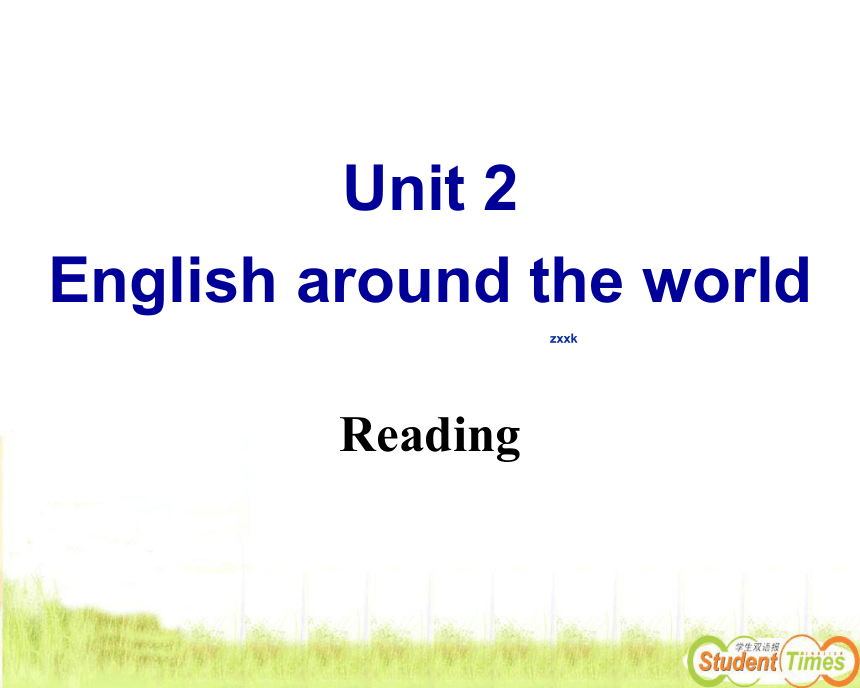
|
|
| 格式 | zip | ||
| 文件大小 | 1.2MB | ||
| 资源类型 | 教案 | ||
| 版本资源 | 人教版(新课程标准) | ||
| 科目 | 英语 | ||
| 更新时间 | 2014-09-05 00:00:00 | ||
图片预览

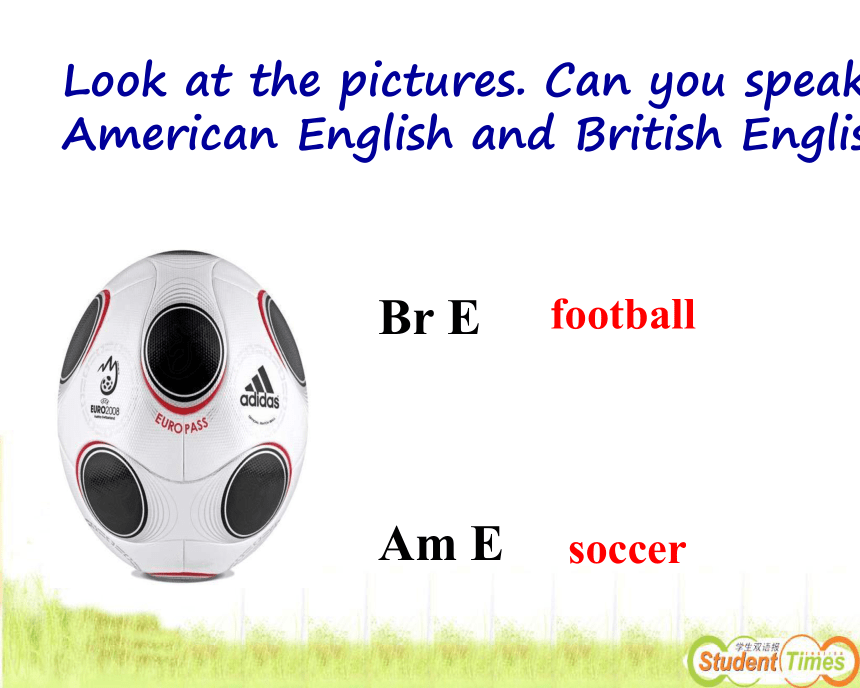
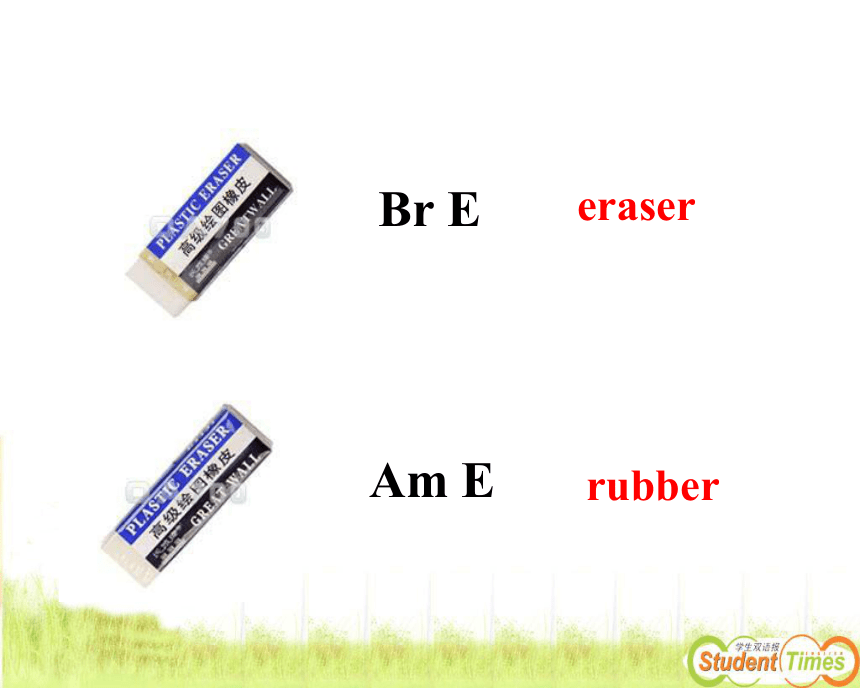
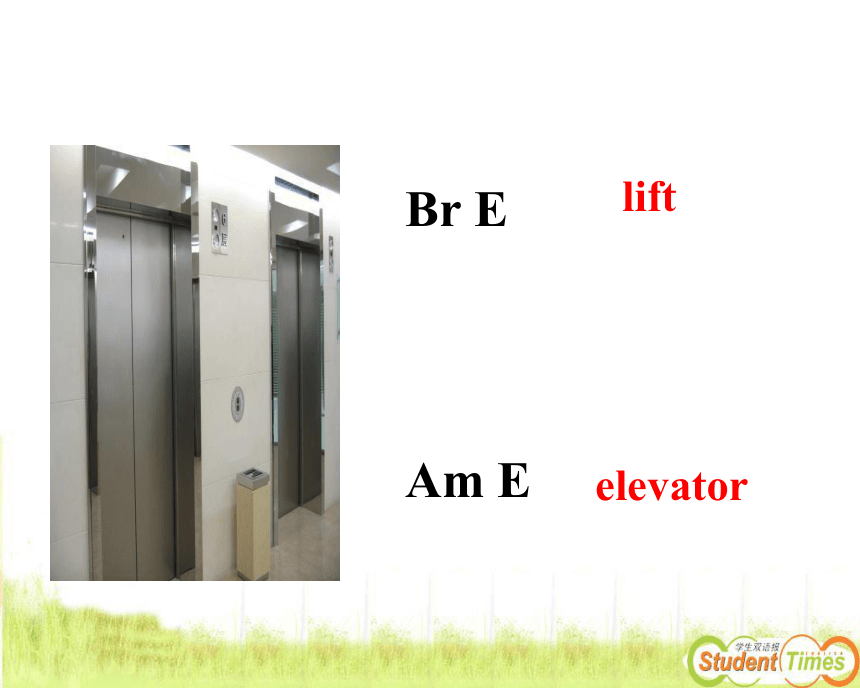
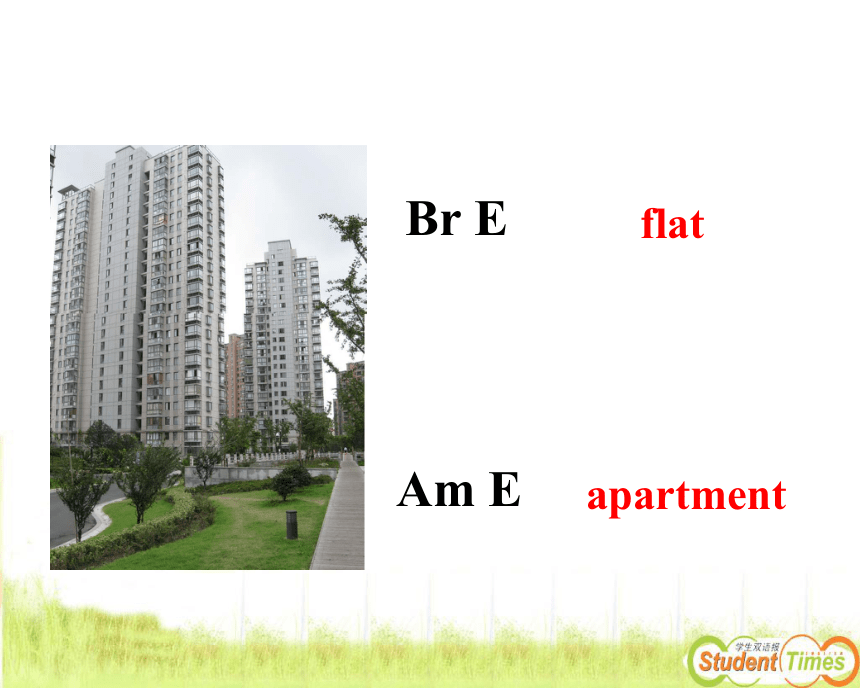
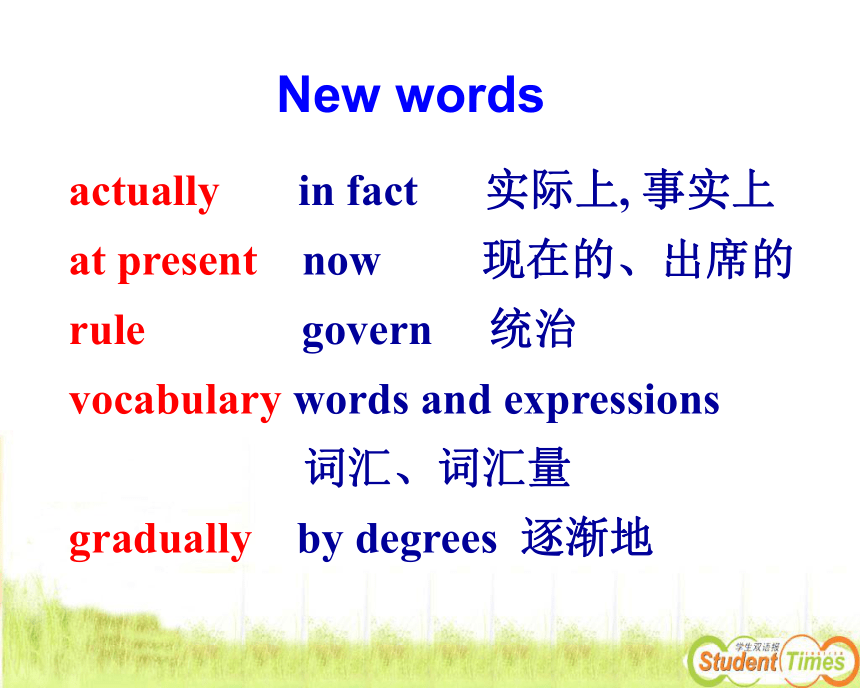
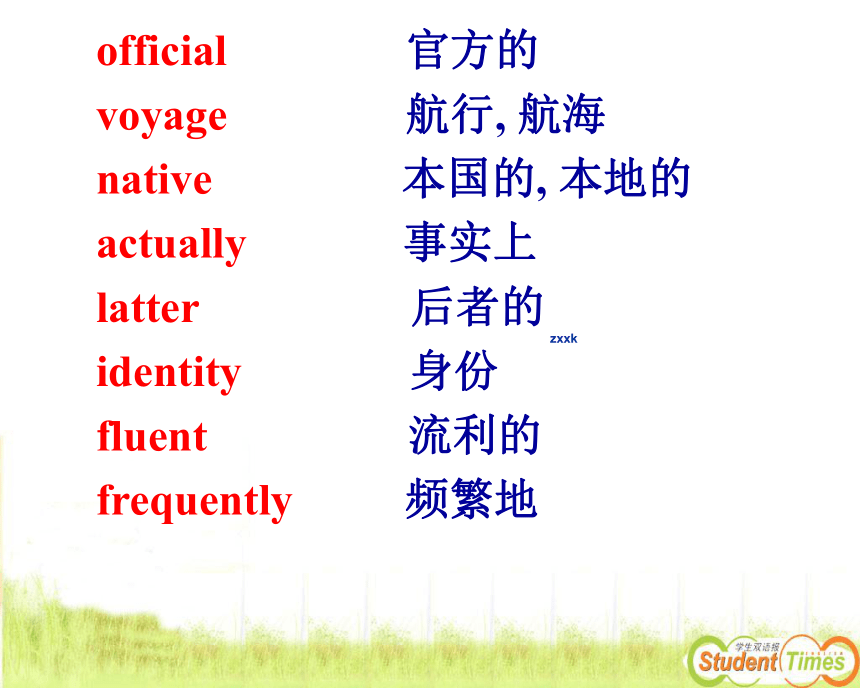
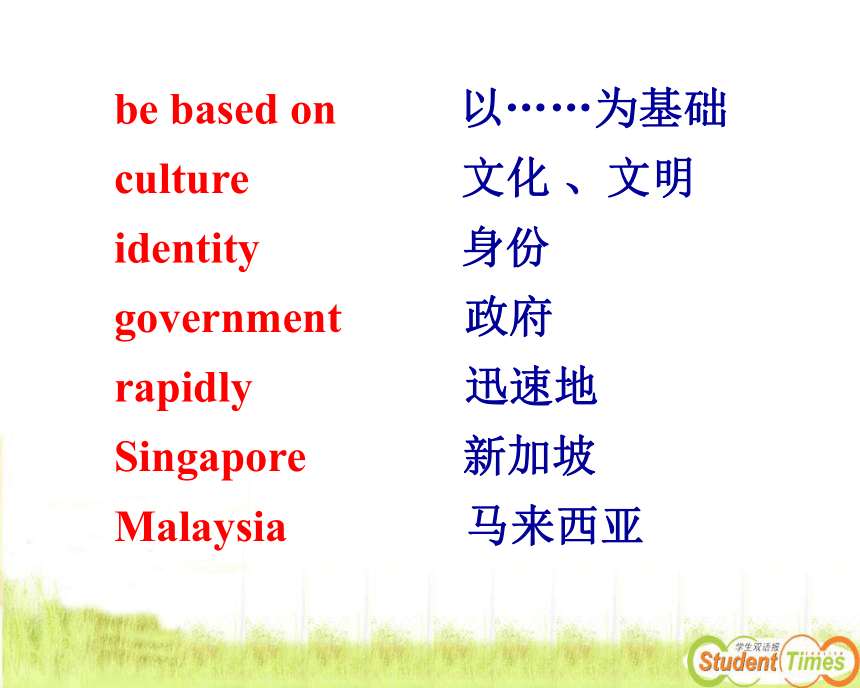
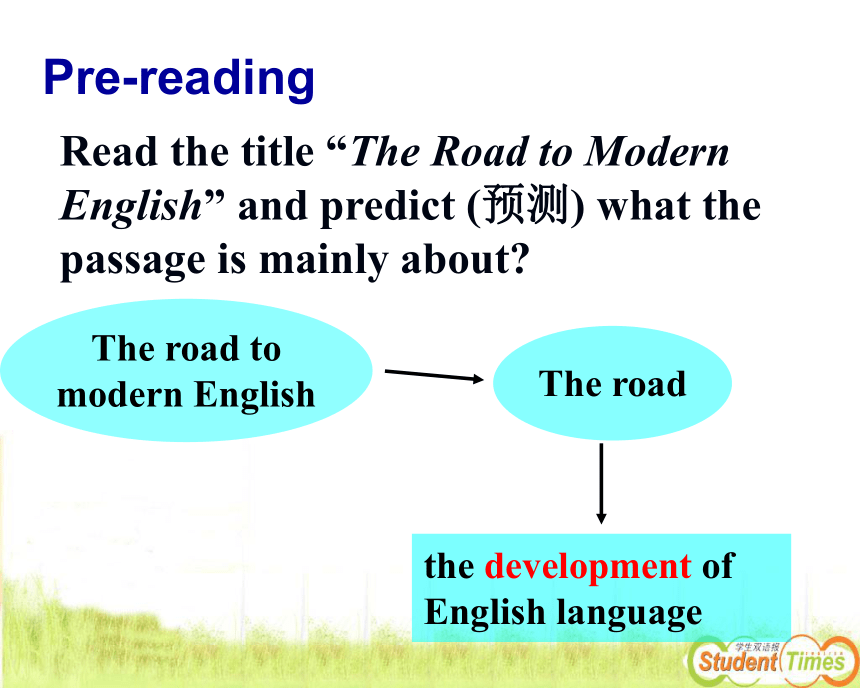
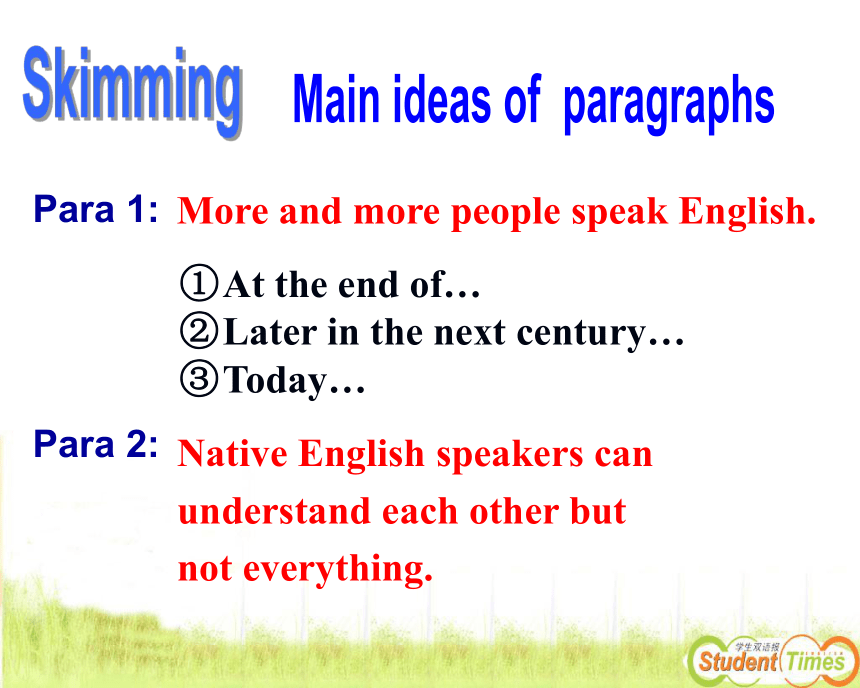
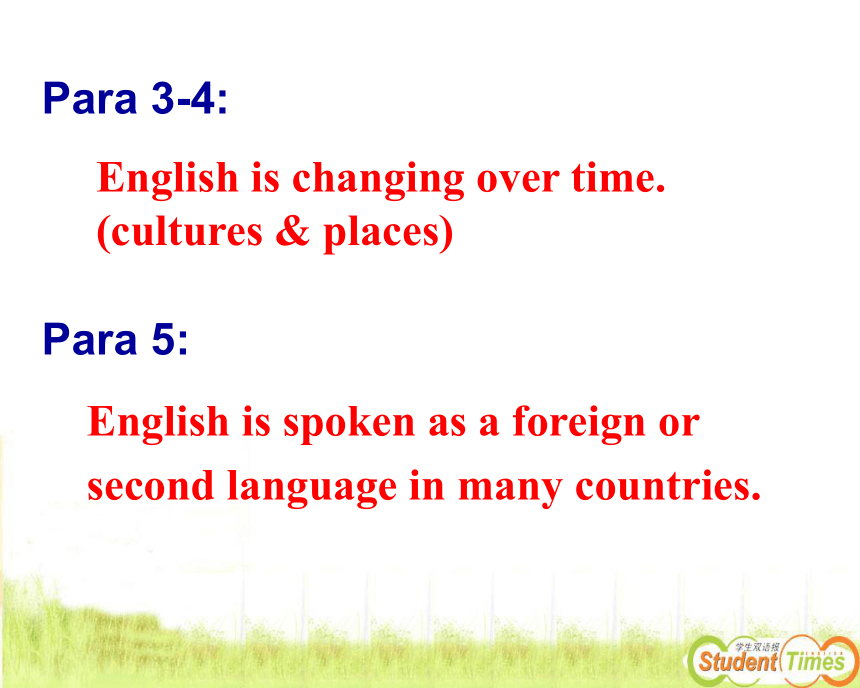
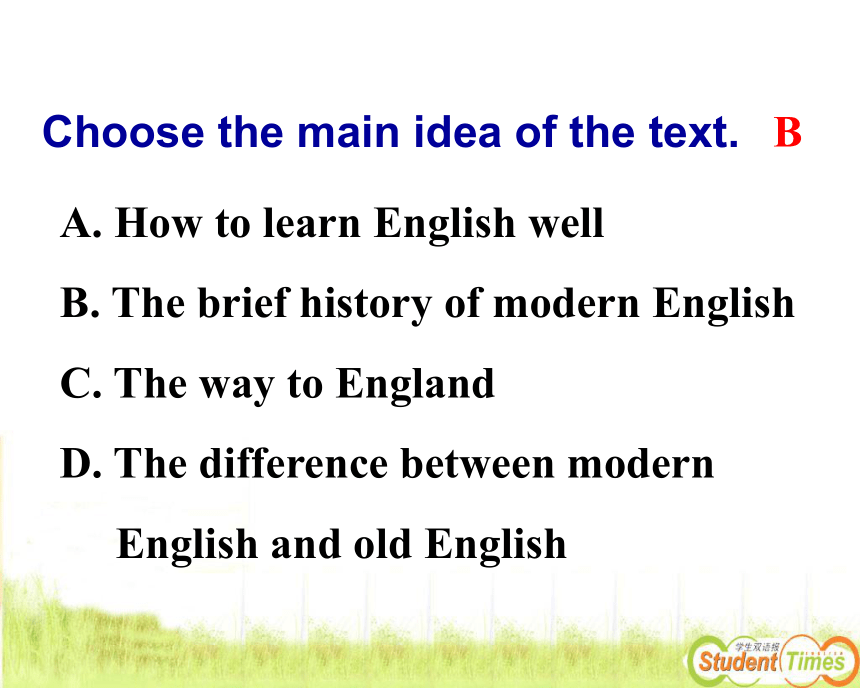
文档简介
课件75张PPT。Unit 2
English around the world
ReadingzxxkAm EBr ELook at the pictures. Can you speak them in
American English and British English?soccerfootballAm EBr EeraserrubberAm EBr EliftelevatorAm EBr Eflatapartmentactually in fact 实际上, 事实上
at present now 现在的、出席的
rule govern 统治
vocabulary words and expressions
词汇、词汇量
gradually by degrees 逐渐地New wordsofficial 官方的
voyage 航行, 航海
native 本国的, 本地的
actually 事实上
latter 后者的
identity 身份
fluent 流利的
frequently 频繁地 zxxkbe based on 以……为基础
culture 文化 、文明
identity 身份
government 政府
rapidly 迅速地
Singapore 新加坡
Malaysia 马来西亚 Pre-readingRead the title “The Road to Modern
English” and predict (预测) what the
passage is mainly about?The road to
modern EnglishThe roadthe development of
English language More and more people speak English.Native English speakers can
understand each other but
not everything.Para 1:Para 2:SkimmingMain ideas of paragraphs At the end of…
Later in the next century…
Today…English is changing over time.
(cultures & places)English is spoken as a foreign or
second language in many countries.Para 3-4:Para 5:A. How to learn English well
B. The brief history of modern English
C. The way to England
D. The difference between modern
English and old EnglishChoose the main idea of the text.B Careful reading: Para 1--Development of Englishthe end of the 16th century the next century today peopleIf an American is talking to an Englishman,
_______.
A. They will have almost no difficulty in
understanding
B. They will have a lot of misunderstandings
between each other
C. The American finds it difficult to
understand the Englishman
D. The English man finds it difficult to
follow the AmericanPara 2A zxxkWhy does English change over time?Because of cultural communication.Read Para 3 and answer
the question: How has English changed over time?
AD 450-1150American Dictionary
of the English
Language was based more on Germanmore like French Shakespeare made use of
a wider vocabularyAmerican English Australian EnglishPara 3-4(rule)(identity)British people
went to Australia 1150-1500In the 1600’s… Find out the characteristics of each time according to the time axis.AD450-1150 800-1150 The time
ADEL was written In the 1600’s laterGermanless like German; more like FrenchShakespeare’s English American EnglishAustralian English GermanThe history of the English languagelessruledShakespeareAmericaAustralia government and education
English spellingdictionaryThe American Dictionary of
the English Language.in South AsiaChina South Africa Samuel Johnson
Born: September 18, 1709
Write a dictionary One of
the English language’s most
profound influences. Two important persons in Para 4 Noah Webster
Born: October 16, 1758
Died: May 28, 1843 When Noah was 43, he
started writing the first
American dictionary.
He did this because
Americans in different
parts of the country
spelled, pronounced and
used words differently. zxxkWhy is India mentioned in the last paragraph?
A. Because India is a typical country who
speaks English as a second language
because of its long being ruled by Britain.
B. Because India has a very large number of
English speakers.
C. Because India is a country where English
plays a very important role in social life.
D. Because India has a long history of
communication with Britain.Para 5 A English is used as… A first language A second languageA foreign language in the UK, USA, Canada,
Australia, South Africa, Ireland
and New Zealand and so on. in India, Pakistan, Nigeria the Philippines, and HK and so on. in China, and so on. timeplaceLanguage can change with time.Language can change
when cultures
communicate with
each other.ConclusionFlow ChartThe Road To Modern EnglishEnglish is not
all the sameEnglish changes
over timeThe end of 16th
CThe
next centuryTodayMore
like
FrenchShake-speare’s timeEnglish speakers
increasingEnglish spread in
Asia and AfricaAm EAustralian
EnglishIndiaOther coun-triesChinaBased
on
German1. English has/had the most speakers____.
now
when the British ruled many parts
of the world
C. in the time of Shakespeare
D. in the 12th century
2. Which of the following statement is true?
Languages always stay the same.
Languages change only after wars.
Languages no longer change.
Languages change when cultures change.A D Choose the correct answer.3. From AD 450 to 1150, English
sounded more like _____.
A. French B. Chinese
C. German D. Russian
4. Shakespeare’s English was spoken
around _____.
A. 1400’s B. 1150’s C. 450’s D. 1600’s
5. Which country has the fastest growing
number of English speakers in the world?
A. Australia B. China
C. India D. BritainC D B Most English speakers in the 16th
century lived in England.
2. More and more people use English
as their first or 2nd language.
3. English began to be spoken in other
countries in 17th century.TTTTrue or False4. Native English speakers can’t
understand each other because
they don’t speak the same kind
of English.
5. As English is widely used, it will
be more and more important to
have a good knowledge of English.
6. Noah Webster wrote The American
Dictionary of the English Language.FTT7. From 1765 to 1947 English became
the language for government and
education in India.
8. America has the largest number
of English learners.
9. English had the most speakers in
the 17th century.
10. English developed when new settlers
and rulers came to Britain.TFFT11. Languages frequently change.
12. The language of the government is
always the language of the country.
13. English is one of the official
languages used in India.
14. This reading describes the
development of the English
language. FTTF1. What is the clue of the passage?
2. When did people from England begin
to move to other parts of the world? Time.In the 17th century.Read the text carefully and
answer the following questions.3. Why does India have a large number of English speakers?India was ruled by Britain from 1765
to 1947. And during that time English
became the language for government
and education.zxxkAt first, only people in ________ spoke English.
Later, people from England _______ to other
parts, so English began to be spoken in
______ _____ _________. Today, _______ people
speak English as their _____, second or foreign
language. _______ English speakers _____
understand each other but ____ ___________. Retell the text.England movedmany other countriesmorefirstNativecannot everythingAll languages change when ________
communicate with one another.
So there are British English, American
English, Australian English and so on.
They all have their own ________.
English is also spoken as a foreign or
second language in _____ ____ _______.
Maybe one day Chinese English will
become one of the world English.culturesidentitymany other countriesThinking Will Chinese English become one of
the world Englishes? “Only time will tell”. DiscussionDo you think it matters what kind
of English you learn? Why?
2. Why do you think people all over
the world want to learn English?Why do so many people want to learn English?To use for
businessTo use in schoolTo talk
to native
speakersTo read English
booksTo write to pen friendsTo listen to English music
and movies 1. Nearly all of them lived in England.
nearly和almost 用法明辨:
(1) 两者通用的场合
a. 在肯定句中
b. 修饰all, every, always 等时
c. 在行为动词的否定式前时
e.g. He is almost/nearly 80 years old.Language Points(2)只用almost 的场合
a. 和any, no, none, nothing, nobody,
nowhere, never 等连用时。
b. 和too, more than 等连用时。
c. 和表示感觉或心理活动的静态
动词连用时。
e.g. There is almost none left.
(3)只用nearly的场合
a. 被 very, not, pretty 等修饰时。
b. 和具体数字连用时(nearly常用)。如:
Nearly 100 students attended the meeting.2. voyage 在此为可数名词, 意为“旅行,
航行”。如:
① The Titanic went under on its first
voyage.
② They supplied this ship with enough
food and necessities for a long voyage.
③ I don’t want to make the voyage
without help.[拓展]
voyage还可用作动词, 意为“(乘船)
航行, 航海”。如:
They planned to voyage across the
Pacific Ocean.
注意区别名词travel, journey, trip
和voyage:
travel 用作不可数名词, 只用于泛指从
某地去另一地,如果某人在某段时间里
到处走, 可用travels;journey用作可数
名词, 表示去某地所花的时间和旅行的距离, 尤指较长距离的或定期的旅行;
trip用作可数名词, 表示非定期的, 也许
较短的往返旅行; voyage则常指海上旅
行或太空旅行。
① Air travel is becoming cheaper.
② He’s on his travels again.
③ Lily had a long and difficult journey
through the mountains last year.
④ The kids are going on a trip to
the castle.3. because of 后边加名词或动名词短语;
because 是连词, 所以后边跟句子。
因为你的关心, 我发现生活充满了希望。
Because you are concerned about
me, I find that life is full of hope.
Because of your concern, I find that
life is full of hope.因为雨下得很大, 那个男孩穿过树林
回家了。
Because it rained heavily, the boy went
back home through the woods.
Because of the heavy rain, the boy went
back home through the woods.
zxxk4. than ever before “比以往任何时候更”
than ever before可看作是than they
ever speak English before 的省略形式。
在比较级结构中,副词 ever 与比较级
和最高级连用,用来加强语气。如:
You’ll speak English much better than
ever before.
Jane looks much prettier than ever before. ever在不同句型中的意义:
1) 曾经; 以前 (用于疑问句)
2) 无论什么时候都 (不) (用于否定句)
3) 曾经 (用于if 从句)
4) 到底; 究竟 (用于特殊疑问句)
5) 永远; 老是 (用于肯定句)5. Native English speakers can
understand each other even if they
don’t speak the same kind of English.
even if =even though “即使”, 用来引导
一个让步状语从句, 后面既可以用陈述
语气, 也可用虚拟语气, 但是even if /
though 引导的从句不用将来时。如:
Even if it rains tomorrow, we will
leave for Beijing.用if, as if, even if 填空。
(1) _________ I had money, I wouldn’t
buy it.
(2) _______ I had money, I would buy it.
(3) It looks __________ it is going to rain.
(even if 引导让步状语从句; if 引导条件
状语从句; as if/though “似乎是……”
引导方式状语从句)Even if If as if注意: (1) even if (= even though): in spite of the
fact; no matter whether 即使; 尽管
是连词词组, 用来引导让步状语从句; 若主、
从句皆表示将来情况, 从句中可用一般现在
时代替将来时。
(2) even if 从句所说的不那么肯定。
even though 从句是事实。
e.g: Even if he is poor, she loves him.
(=He may be poor, yet she loves him.)
(Even) though he is poor, she loves him.
(= He is poor, yet she loves him.)When talking to a friend over the
telephone, you feel that you are
close _______ the actual distance
is not shortened.
A. but B. even if
C. so D. becauseB① A child came up to me and showed me
the way to the station.
② The sun comes up in the east.
New shoots of bamboo will come up
from around the roots of the old ones.
Your question came up at the meeting.
come about 出现;发生6. come up 上来, 走近; 发芽; 被提出; 升起 走近, 上来 升起被提出 come across 偶然遇到或找到
come around 恢复; 还原; 改变某人的
意见或立场
come down 传承; 按习惯通过或处理
come out 成为众所周知; 发行或发表;
结果; 自己公开宣布
come over 过来; 偶然拜访
come up with 宣布或发现
The doctor came up with a cure for
the disease.7. So why has English changed over time?
那么, 英语在一段时间里为什么会起变化呢?
over 贯穿, 经过 (一段时间)
e.g.经过这些年, 他变得更有耐心。
Over the years, he has become more patient.
周末她会来杭州。
She will come to Hangzhou over the weekend.
圣诞节时你在家吗?
Will you stay at home over Christmas?
over 超过(=more than), 再三 (again)
over 2 minutes over and over8. It was based more on German than
the English we speak at present.
当时的英语更多的是以德语为基础的,
而现代英语不是。
1) base v. 意为“以……为根据,
把基础设在……”, 常构成短语
base sth. on/upon sth。如:This novel is based on fact.
这部小说是以事实为根据的。
The paper had intended to base itself
in London.
This film is based on a novel by D. H.
Lawrence.
[拓展]
base还可用作名词, 意为“底部, 基地,
基础”等。如:There is a door at the base of the tower.
How many military bases are they
maintaining on foreign soil?
Many languages have Latin as their base.
掌握base构成的两个短语:
be off base 完全错误, 大错特错
touch base (with) sb
(跟某人) 联系上, 逗留2) more…than… 是……而不是……;
与其说……不如说……; 中间接相同
成分。
He is more a friend than a teacher.
He is more lazy than stupid.
扩展: more than 不仅仅; 多于; 十分
e.g. He is more than a teacher in our school.
He made more than ten friends in this club.
She is more than beautiful.
rather than 而不是; less than少于;
other than 除……之外3) present adj. 当前的, 现在的 (作前置定语)
Did you see the present national leaders?
Can you tell us something about the
present situation?
出席的, 在场的 (作表语或后置定语)
Our teacher was present at the meeting.
All the people present agree to my plan. n. 目前, 现在; 礼物
I can’t spare time because I am busy
at present.
What present did you receive from
your parents?
at present: now; at this time/moment
She’s busy at present and can’t speak
to you. 她现在很忙, 不能跟你谈话。
At present he is a professor of
mathematics at Cambridge.
目前他是剑桥大学的数学教授。vt. 赠与,给, 提出
present sb. with sth. 或present sth. to sb.
把……交给, 颁发, 授予 如:
Mother presented a gift to me just now.
On his birthday, his friends presented
him with a series of readers/presented
a series of readers to him.
(送给他一套《读者》) 9. Shakespeare made use of a wider
vocabulary than ever before.
莎士比亚使用了比以往任何时候更为
广泛的词汇量。
make use of 利用, 使用
make good/full use of 充分使用
make no use of sth. 没有利用
We could make good use of our resources.
我们应该充分利用好我们的资源。
Every minute should be made good
use of. 每一分钟都应该很好地利用。She makes use of people she meets as
heroes for her novel.
We should make good use of time to
study.
[拓展]
make构成的常见短语: make of、
make from 通常用于被动语态,
构成be made of、be made from 都
表示“由……制成”。其中be made of 表示在产品中能够看出
原材料; be made from 表示在产品中
看不出原材料。
make up 编写, 编造;和解
make up of 由……组成/构成;
make up for 弥补, 补偿
make out 理解, 弄懂; 看清, (勉强)
辨认出; 假装, 装成
make into 制成……
make it 成功, 办成; 及时赶到10. the number of/ a number of
the number of “……的数目”, 接可数
名词复数, 其后谓语动词用单数。
The number of undergraduates has
increased over the years.
a number of 许多, 大量 (后接复数名词),
其后谓语动词用复数。
(a great number of/a large number of/
a small number of )
A number of teachers agree with me.The number of people invited _____
fifty, but a number of them ___ absent
for different reasons.
A. were; was B. was; was
C. was; were D. were; wereC注意: 只能修饰可数名词的
a large/great/good number of,
a good/great many, dozens of,
scores of, quite a few 只能修饰不可数名词的:
a great deal of, a large amount of,
quite a little, a large sum of 既可修饰可数也可修饰不可数名词的:
plenty of, a lot of, lots of,
a large quantity of 11. such as & for example such as 用来列举事物时, 一般列举同类
人或事物中的几个例子且所列举事物的
数量不能等于它前面所提到的总和,
一旦相等, 要用that is 或namely.
I have three good friends, such as John,
Jack and Tom.
He can speak four languages, such as
English and French.×for example: 用来举例说明某一论点或情况,一般只举同类人或物中的 “一个” 为例,作插入语,可位于句首,句中或句尾,通常与所给的例子用逗号隔开,其后的例子可以是从句。Ball games, for example, have spread
around the world.
There are many kinds of pollution (污染)
Noise, for example, is a kind of pollution.用such as, for example, namely填空
(1) Students, _______ Tom and Mary,
should be learnt from.
(2) Wear something simple, ___________,
a skirt and blouse.
(3) He knows six languages, ________
Chinese, French, English, Spanish,
Russian and Portuguese.such asfor examplenamely12. Only time can tell.
惟有时间将能证明。
tell vi. 显示出; 发生影响; 起作用; 判断
tell A from B: 区分, 分别
Can you tell Tom from his twin brother?13. frequently adv. 经常地, 频繁地
e.g. He was frequently drunk.
Stores of grain are frequently attacked
by pests.frequently的形容词是frequent, 意为
“经常的, 频繁的”。如:
He is a frequent visitor to our house.
Her headaches are becoming less frequent.
Frequent 还可用作动词, 意为“常到,
常去”。如:
The bar was frequented by actors
from the nearby theatre.
These woods are frequented by all
kinds of birds. Homework
1. Memorize the new words.
2. Retell the passage.
3. Finish exercises in Learning
about language.
English around the world
ReadingzxxkAm EBr ELook at the pictures. Can you speak them in
American English and British English?soccerfootballAm EBr EeraserrubberAm EBr EliftelevatorAm EBr Eflatapartmentactually in fact 实际上, 事实上
at present now 现在的、出席的
rule govern 统治
vocabulary words and expressions
词汇、词汇量
gradually by degrees 逐渐地New wordsofficial 官方的
voyage 航行, 航海
native 本国的, 本地的
actually 事实上
latter 后者的
identity 身份
fluent 流利的
frequently 频繁地 zxxkbe based on 以……为基础
culture 文化 、文明
identity 身份
government 政府
rapidly 迅速地
Singapore 新加坡
Malaysia 马来西亚 Pre-readingRead the title “The Road to Modern
English” and predict (预测) what the
passage is mainly about?The road to
modern EnglishThe roadthe development of
English language More and more people speak English.Native English speakers can
understand each other but
not everything.Para 1:Para 2:SkimmingMain ideas of paragraphs At the end of…
Later in the next century…
Today…English is changing over time.
(cultures & places)English is spoken as a foreign or
second language in many countries.Para 3-4:Para 5:A. How to learn English well
B. The brief history of modern English
C. The way to England
D. The difference between modern
English and old EnglishChoose the main idea of the text.B Careful reading: Para 1--Development of Englishthe end of the 16th century the next century today peopleIf an American is talking to an Englishman,
_______.
A. They will have almost no difficulty in
understanding
B. They will have a lot of misunderstandings
between each other
C. The American finds it difficult to
understand the Englishman
D. The English man finds it difficult to
follow the AmericanPara 2A zxxkWhy does English change over time?Because of cultural communication.Read Para 3 and answer
the question: How has English changed over time?
AD 450-1150American Dictionary
of the English
Language was based more on Germanmore like French Shakespeare made use of
a wider vocabularyAmerican English Australian EnglishPara 3-4(rule)(identity)British people
went to Australia 1150-1500In the 1600’s… Find out the characteristics of each time according to the time axis.AD450-1150 800-1150 The time
ADEL was written In the 1600’s laterGermanless like German; more like FrenchShakespeare’s English American EnglishAustralian English GermanThe history of the English languagelessruledShakespeareAmericaAustralia government and education
English spellingdictionaryThe American Dictionary of
the English Language.in South AsiaChina South Africa Samuel Johnson
Born: September 18, 1709
Write a dictionary One of
the English language’s most
profound influences. Two important persons in Para 4 Noah Webster
Born: October 16, 1758
Died: May 28, 1843 When Noah was 43, he
started writing the first
American dictionary.
He did this because
Americans in different
parts of the country
spelled, pronounced and
used words differently. zxxkWhy is India mentioned in the last paragraph?
A. Because India is a typical country who
speaks English as a second language
because of its long being ruled by Britain.
B. Because India has a very large number of
English speakers.
C. Because India is a country where English
plays a very important role in social life.
D. Because India has a long history of
communication with Britain.Para 5 A English is used as… A first language A second languageA foreign language in the UK, USA, Canada,
Australia, South Africa, Ireland
and New Zealand and so on. in India, Pakistan, Nigeria the Philippines, and HK and so on. in China, and so on. timeplaceLanguage can change with time.Language can change
when cultures
communicate with
each other.ConclusionFlow ChartThe Road To Modern EnglishEnglish is not
all the sameEnglish changes
over timeThe end of 16th
CThe
next centuryTodayMore
like
FrenchShake-speare’s timeEnglish speakers
increasingEnglish spread in
Asia and AfricaAm EAustralian
EnglishIndiaOther coun-triesChinaBased
on
German1. English has/had the most speakers____.
now
when the British ruled many parts
of the world
C. in the time of Shakespeare
D. in the 12th century
2. Which of the following statement is true?
Languages always stay the same.
Languages change only after wars.
Languages no longer change.
Languages change when cultures change.A D Choose the correct answer.3. From AD 450 to 1150, English
sounded more like _____.
A. French B. Chinese
C. German D. Russian
4. Shakespeare’s English was spoken
around _____.
A. 1400’s B. 1150’s C. 450’s D. 1600’s
5. Which country has the fastest growing
number of English speakers in the world?
A. Australia B. China
C. India D. BritainC D B Most English speakers in the 16th
century lived in England.
2. More and more people use English
as their first or 2nd language.
3. English began to be spoken in other
countries in 17th century.TTTTrue or False4. Native English speakers can’t
understand each other because
they don’t speak the same kind
of English.
5. As English is widely used, it will
be more and more important to
have a good knowledge of English.
6. Noah Webster wrote The American
Dictionary of the English Language.FTT7. From 1765 to 1947 English became
the language for government and
education in India.
8. America has the largest number
of English learners.
9. English had the most speakers in
the 17th century.
10. English developed when new settlers
and rulers came to Britain.TFFT11. Languages frequently change.
12. The language of the government is
always the language of the country.
13. English is one of the official
languages used in India.
14. This reading describes the
development of the English
language. FTTF1. What is the clue of the passage?
2. When did people from England begin
to move to other parts of the world? Time.In the 17th century.Read the text carefully and
answer the following questions.3. Why does India have a large number of English speakers?India was ruled by Britain from 1765
to 1947. And during that time English
became the language for government
and education.zxxkAt first, only people in ________ spoke English.
Later, people from England _______ to other
parts, so English began to be spoken in
______ _____ _________. Today, _______ people
speak English as their _____, second or foreign
language. _______ English speakers _____
understand each other but ____ ___________. Retell the text.England movedmany other countriesmorefirstNativecannot everythingAll languages change when ________
communicate with one another.
So there are British English, American
English, Australian English and so on.
They all have their own ________.
English is also spoken as a foreign or
second language in _____ ____ _______.
Maybe one day Chinese English will
become one of the world English.culturesidentitymany other countriesThinking Will Chinese English become one of
the world Englishes? “Only time will tell”. DiscussionDo you think it matters what kind
of English you learn? Why?
2. Why do you think people all over
the world want to learn English?Why do so many people want to learn English?To use for
businessTo use in schoolTo talk
to native
speakersTo read English
booksTo write to pen friendsTo listen to English music
and movies 1. Nearly all of them lived in England.
nearly和almost 用法明辨:
(1) 两者通用的场合
a. 在肯定句中
b. 修饰all, every, always 等时
c. 在行为动词的否定式前时
e.g. He is almost/nearly 80 years old.Language Points(2)只用almost 的场合
a. 和any, no, none, nothing, nobody,
nowhere, never 等连用时。
b. 和too, more than 等连用时。
c. 和表示感觉或心理活动的静态
动词连用时。
e.g. There is almost none left.
(3)只用nearly的场合
a. 被 very, not, pretty 等修饰时。
b. 和具体数字连用时(nearly常用)。如:
Nearly 100 students attended the meeting.2. voyage 在此为可数名词, 意为“旅行,
航行”。如:
① The Titanic went under on its first
voyage.
② They supplied this ship with enough
food and necessities for a long voyage.
③ I don’t want to make the voyage
without help.[拓展]
voyage还可用作动词, 意为“(乘船)
航行, 航海”。如:
They planned to voyage across the
Pacific Ocean.
注意区别名词travel, journey, trip
和voyage:
travel 用作不可数名词, 只用于泛指从
某地去另一地,如果某人在某段时间里
到处走, 可用travels;journey用作可数
名词, 表示去某地所花的时间和旅行的距离, 尤指较长距离的或定期的旅行;
trip用作可数名词, 表示非定期的, 也许
较短的往返旅行; voyage则常指海上旅
行或太空旅行。
① Air travel is becoming cheaper.
② He’s on his travels again.
③ Lily had a long and difficult journey
through the mountains last year.
④ The kids are going on a trip to
the castle.3. because of 后边加名词或动名词短语;
because 是连词, 所以后边跟句子。
因为你的关心, 我发现生活充满了希望。
Because you are concerned about
me, I find that life is full of hope.
Because of your concern, I find that
life is full of hope.因为雨下得很大, 那个男孩穿过树林
回家了。
Because it rained heavily, the boy went
back home through the woods.
Because of the heavy rain, the boy went
back home through the woods.
zxxk4. than ever before “比以往任何时候更”
than ever before可看作是than they
ever speak English before 的省略形式。
在比较级结构中,副词 ever 与比较级
和最高级连用,用来加强语气。如:
You’ll speak English much better than
ever before.
Jane looks much prettier than ever before. ever在不同句型中的意义:
1) 曾经; 以前 (用于疑问句)
2) 无论什么时候都 (不) (用于否定句)
3) 曾经 (用于if 从句)
4) 到底; 究竟 (用于特殊疑问句)
5) 永远; 老是 (用于肯定句)5. Native English speakers can
understand each other even if they
don’t speak the same kind of English.
even if =even though “即使”, 用来引导
一个让步状语从句, 后面既可以用陈述
语气, 也可用虚拟语气, 但是even if /
though 引导的从句不用将来时。如:
Even if it rains tomorrow, we will
leave for Beijing.用if, as if, even if 填空。
(1) _________ I had money, I wouldn’t
buy it.
(2) _______ I had money, I would buy it.
(3) It looks __________ it is going to rain.
(even if 引导让步状语从句; if 引导条件
状语从句; as if/though “似乎是……”
引导方式状语从句)Even if If as if注意: (1) even if (= even though): in spite of the
fact; no matter whether 即使; 尽管
是连词词组, 用来引导让步状语从句; 若主、
从句皆表示将来情况, 从句中可用一般现在
时代替将来时。
(2) even if 从句所说的不那么肯定。
even though 从句是事实。
e.g: Even if he is poor, she loves him.
(=He may be poor, yet she loves him.)
(Even) though he is poor, she loves him.
(= He is poor, yet she loves him.)When talking to a friend over the
telephone, you feel that you are
close _______ the actual distance
is not shortened.
A. but B. even if
C. so D. becauseB① A child came up to me and showed me
the way to the station.
② The sun comes up in the east.
New shoots of bamboo will come up
from around the roots of the old ones.
Your question came up at the meeting.
come about 出现;发生6. come up 上来, 走近; 发芽; 被提出; 升起 走近, 上来 升起被提出 come across 偶然遇到或找到
come around 恢复; 还原; 改变某人的
意见或立场
come down 传承; 按习惯通过或处理
come out 成为众所周知; 发行或发表;
结果; 自己公开宣布
come over 过来; 偶然拜访
come up with 宣布或发现
The doctor came up with a cure for
the disease.7. So why has English changed over time?
那么, 英语在一段时间里为什么会起变化呢?
over 贯穿, 经过 (一段时间)
e.g.经过这些年, 他变得更有耐心。
Over the years, he has become more patient.
周末她会来杭州。
She will come to Hangzhou over the weekend.
圣诞节时你在家吗?
Will you stay at home over Christmas?
over 超过(=more than), 再三 (again)
over 2 minutes over and over8. It was based more on German than
the English we speak at present.
当时的英语更多的是以德语为基础的,
而现代英语不是。
1) base v. 意为“以……为根据,
把基础设在……”, 常构成短语
base sth. on/upon sth。如:This novel is based on fact.
这部小说是以事实为根据的。
The paper had intended to base itself
in London.
This film is based on a novel by D. H.
Lawrence.
[拓展]
base还可用作名词, 意为“底部, 基地,
基础”等。如:There is a door at the base of the tower.
How many military bases are they
maintaining on foreign soil?
Many languages have Latin as their base.
掌握base构成的两个短语:
be off base 完全错误, 大错特错
touch base (with) sb
(跟某人) 联系上, 逗留2) more…than… 是……而不是……;
与其说……不如说……; 中间接相同
成分。
He is more a friend than a teacher.
He is more lazy than stupid.
扩展: more than 不仅仅; 多于; 十分
e.g. He is more than a teacher in our school.
He made more than ten friends in this club.
She is more than beautiful.
rather than 而不是; less than少于;
other than 除……之外3) present adj. 当前的, 现在的 (作前置定语)
Did you see the present national leaders?
Can you tell us something about the
present situation?
出席的, 在场的 (作表语或后置定语)
Our teacher was present at the meeting.
All the people present agree to my plan. n. 目前, 现在; 礼物
I can’t spare time because I am busy
at present.
What present did you receive from
your parents?
at present: now; at this time/moment
She’s busy at present and can’t speak
to you. 她现在很忙, 不能跟你谈话。
At present he is a professor of
mathematics at Cambridge.
目前他是剑桥大学的数学教授。vt. 赠与,给, 提出
present sb. with sth. 或present sth. to sb.
把……交给, 颁发, 授予 如:
Mother presented a gift to me just now.
On his birthday, his friends presented
him with a series of readers/presented
a series of readers to him.
(送给他一套《读者》) 9. Shakespeare made use of a wider
vocabulary than ever before.
莎士比亚使用了比以往任何时候更为
广泛的词汇量。
make use of 利用, 使用
make good/full use of 充分使用
make no use of sth. 没有利用
We could make good use of our resources.
我们应该充分利用好我们的资源。
Every minute should be made good
use of. 每一分钟都应该很好地利用。She makes use of people she meets as
heroes for her novel.
We should make good use of time to
study.
[拓展]
make构成的常见短语: make of、
make from 通常用于被动语态,
构成be made of、be made from 都
表示“由……制成”。其中be made of 表示在产品中能够看出
原材料; be made from 表示在产品中
看不出原材料。
make up 编写, 编造;和解
make up of 由……组成/构成;
make up for 弥补, 补偿
make out 理解, 弄懂; 看清, (勉强)
辨认出; 假装, 装成
make into 制成……
make it 成功, 办成; 及时赶到10. the number of/ a number of
the number of “……的数目”, 接可数
名词复数, 其后谓语动词用单数。
The number of undergraduates has
increased over the years.
a number of 许多, 大量 (后接复数名词),
其后谓语动词用复数。
(a great number of/a large number of/
a small number of )
A number of teachers agree with me.The number of people invited _____
fifty, but a number of them ___ absent
for different reasons.
A. were; was B. was; was
C. was; were D. were; wereC注意: 只能修饰可数名词的
a large/great/good number of,
a good/great many, dozens of,
scores of, quite a few 只能修饰不可数名词的:
a great deal of, a large amount of,
quite a little, a large sum of 既可修饰可数也可修饰不可数名词的:
plenty of, a lot of, lots of,
a large quantity of 11. such as & for example such as 用来列举事物时, 一般列举同类
人或事物中的几个例子且所列举事物的
数量不能等于它前面所提到的总和,
一旦相等, 要用that is 或namely.
I have three good friends, such as John,
Jack and Tom.
He can speak four languages, such as
English and French.×for example: 用来举例说明某一论点或情况,一般只举同类人或物中的 “一个” 为例,作插入语,可位于句首,句中或句尾,通常与所给的例子用逗号隔开,其后的例子可以是从句。Ball games, for example, have spread
around the world.
There are many kinds of pollution (污染)
Noise, for example, is a kind of pollution.用such as, for example, namely填空
(1) Students, _______ Tom and Mary,
should be learnt from.
(2) Wear something simple, ___________,
a skirt and blouse.
(3) He knows six languages, ________
Chinese, French, English, Spanish,
Russian and Portuguese.such asfor examplenamely12. Only time can tell.
惟有时间将能证明。
tell vi. 显示出; 发生影响; 起作用; 判断
tell A from B: 区分, 分别
Can you tell Tom from his twin brother?13. frequently adv. 经常地, 频繁地
e.g. He was frequently drunk.
Stores of grain are frequently attacked
by pests.frequently的形容词是frequent, 意为
“经常的, 频繁的”。如:
He is a frequent visitor to our house.
Her headaches are becoming less frequent.
Frequent 还可用作动词, 意为“常到,
常去”。如:
The bar was frequented by actors
from the nearby theatre.
These woods are frequented by all
kinds of birds. Homework
1. Memorize the new words.
2. Retell the passage.
3. Finish exercises in Learning
about language.
